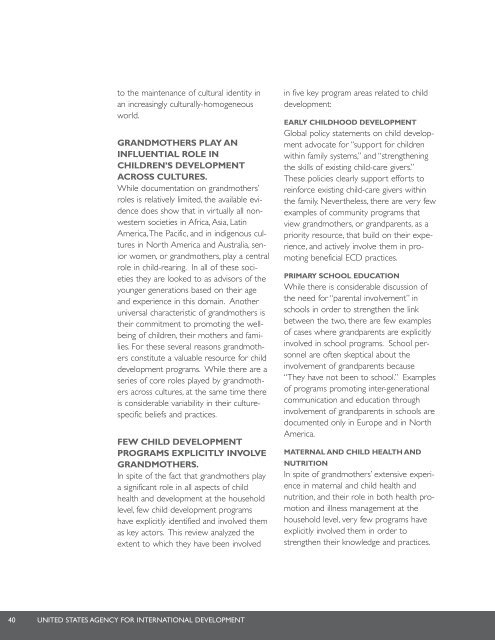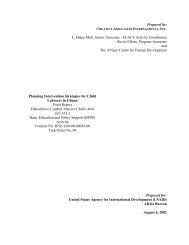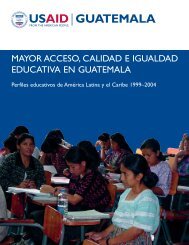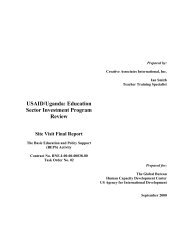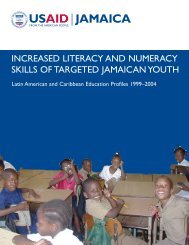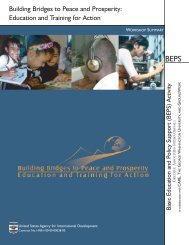Grandmothers: A Learning Institution - Basic Education and Policy ...
Grandmothers: A Learning Institution - Basic Education and Policy ...
Grandmothers: A Learning Institution - Basic Education and Policy ...
- No tags were found...
Create successful ePaper yourself
Turn your PDF publications into a flip-book with our unique Google optimized e-Paper software.
to the maintenance of cultural identity inan increasingly culturally-homogeneousworld.GRANDMOTHERS PLAY ANINFLUENTIAL ROLE INCHILDREN’S DEVELOPMENTACROSS CULTURES.While documentation on gr<strong>and</strong>mothers’roles is relatively limited, the available evidencedoes show that in virtually all nonwesternsocieties in Africa, Asia, LatinAmerica,The Pacific, <strong>and</strong> in indigenous culturesin North America <strong>and</strong> Australia, seniorwomen, or gr<strong>and</strong>mothers, play a centralrole in child-rearing. In all of these societiesthey are looked to as advisors of theyounger generations based on their age<strong>and</strong> experience in this domain. Anotheruniversal characteristic of gr<strong>and</strong>mothers istheir commitment to promoting the wellbeingof children, their mothers <strong>and</strong> families.For these several reasons gr<strong>and</strong>mothersconstitute a valuable resource for childdevelopment programs. While there are aseries of core roles played by gr<strong>and</strong>mothersacross cultures, at the same time thereis considerable variability in their culturespecificbeliefs <strong>and</strong> practices.FEW CHILD DEVELOPMENTPROGRAMS EXPLICITLY INVOLVEGRANDMOTHERS.In spite of the fact that gr<strong>and</strong>mothers playa significant role in all aspects of childhealth <strong>and</strong> development at the householdlevel, few child development programshave explicitly identified <strong>and</strong> involved themas key actors. This review analyzed theextent to which they have been involvedin five key program areas related to childdevelopment:EARLY CHILDHOOD DEVELOPMENTGlobal policy statements on child developmentadvocate for “support for childrenwithin family systems,” <strong>and</strong> “strengtheningthe skills of existing child-care givers.”These policies clearly support efforts toreinforce existing child-care givers withinthe family. Nevertheless, there are very fewexamples of community programs thatview gr<strong>and</strong>mothers, or gr<strong>and</strong>parents, as apriority resource, that build on their experience,<strong>and</strong> actively involve them in promotingbeneficial ECD practices.PRIMARY SCHOOL EDUCATIONWhile there is considerable discussion ofthe need for “parental involvement” inschools in order to strengthen the linkbetween the two, there are few examplesof cases where gr<strong>and</strong>parents are explicitlyinvolved in school programs. School personnelare often skeptical about theinvolvement of gr<strong>and</strong>parents because“They have not been to school.” Examplesof programs promoting inter-generationalcommunication <strong>and</strong> education throughinvolvement of gr<strong>and</strong>parents in schools aredocumented only in Europe <strong>and</strong> in NorthAmerica.MATERNAL AND CHILD HEALTH ANDNUTRITIONIn spite of gr<strong>and</strong>mothers’ extensive experiencein maternal <strong>and</strong> child health <strong>and</strong>nutrition, <strong>and</strong> their role in both health promotion<strong>and</strong> illness management at thehousehold level, very few programs haveexplicitly involved them in order tostrengthen their knowledge <strong>and</strong> practices.40 UNITED STATES AGENCY FOR INTERNATIONAL DEVELOPMENT


